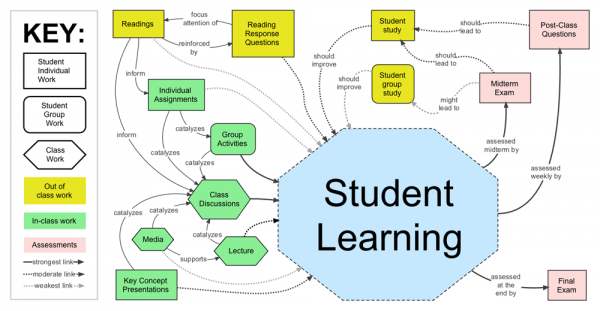How will I deliver conceptual understanding?
Posted 25 Jul 2013 / 0Now that I have made the decision to seriously assess my conceptual teaching, it is time for me to take a look at what might produce student learning. As I described in my previous post, I plan to dramatically overhaul my The Evolution of Cooperation course to optimize the value of everything that makes up my teaching. In the end this will mean looking microscopically at what I do and ask students to do in the course, but before a closer examination can take place I need to make sure that I understand the larger picture.
As I have discussed many times before, there is no substitute for explicitly mapping out ideas, processes, and plans. To this end I decided to create a concise concept map describing how I plan to foster student learning in my The Evolution of Cooperation course. Here is the concept map that I came up with (you can click on the map to enlarge the image):
Primarily this diagram is an inventory of what I will do: it shows all the assignments, activities, and assessments that the course will require. But the inventory is only valuable once I add in an explanation of how I expect different elements of the course to contribute to student learning.
I used shapes and colors to map out different kinds of coursework. Work required of students outside of class (i.e. homework) is in gold, work completed in class is in green, and assessments are in pink. Hard squares represent work done by individual students, rounded squares work done by groups of students, and hexagons work done as a class.
I used connectors (i.e. arrows) to show relationships between different coursework. Thin arrows show how different kinds of work interact with each other. Three gauges of thicker lines show contributions to student learning: solid dark lines show strong contributors, hashed dark lines moderate contributors, and hashed light lines weak contributors.
The resulting map shows not only the mechanisms by which I expect students to learn, but also the relative importance that different kinds of coursework are expected to play. For instance, you can se that I do not expect the course readings to play a very strong direct role in student learning. This is simply another way of saying “reading alone is not going to provide sufficient student learning”; if reading alone was enough, my only role would be as reading list curator. The readings do, however, play an integral role in student learning: the are reinforced by the Reading Response Questions, which I expect to play a moderate role in fostering student learning. And the course readings also inform individual assignments and discussions that will take place in class.
Looking at the overall map, you can get the sense of what coursework I expect to generate the most student learning: Group Activities and Class Discussions. Essentially, all other work should support these two critical elements of the course. Lectures, for example, should catalyze discussions but not be relied on as a primary source of student learning. What I really want to get good at this coming semester is designing valuable activities and fostering productive discussions. I think that I already do both of these pretty well, but now I am actually going to put that assertion to the test.
The assessments that I will use are laid out and are fairly simple: every week students will complete Post-Class Questions (PCQ’s), and there will be Midterm and Final Exams. As my map indicates, I expect that student performance on the PCQ’s and Midterm Exam
will spur students to study, at least on their own and perhaps in groups. I expect this feedback into student studying should improve student learning, although I am not relying solely on the students to produce all learning.
The diagram above represents both a roadmap for what I plan to do and a kind of hypothesis about how learning will work. But of course I will not know whether this map is reasonable until I start assessing student learning.
The work described in this post is part of the larger Conceptual Teaching Assessment Project.
A Major Post, Assessment Methods, Concept Mapping, Conceptual Teaching Assessment Project, Evolution Education, MSCI-463, The Evolution of Cooperation



